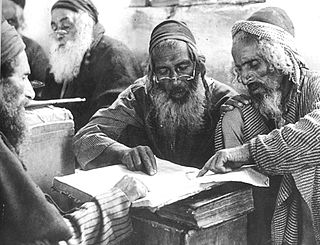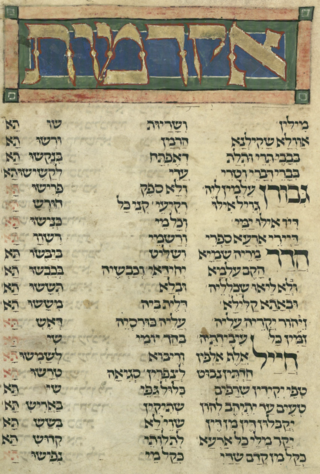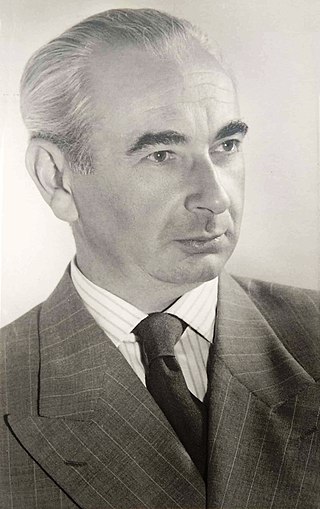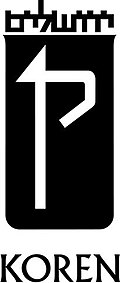
Rabbi Adin Even-Israel Steinsaltz was an Israeli Chabad Chasidic rabbi, teacher, philosopher, social critic, author, translator and publisher.

Jewish prayer is the prayer recitation that forms part of the observance of Rabbinic Judaism. These prayers, often with instructions and commentary, are found in the Siddur, the traditional Jewish prayer book.

A siddur is a Jewish prayer book containing a set order of daily prayers. The word siddur comes from the Hebrew root ס־ד־ר, meaning 'order.'

The Talmud is, after the Hebrew Bible, the central text of Rabbinic Judaism and the primary source of Jewish religious law (halakha) and Jewish theology. Until the advent of modernity, in nearly all Jewish communities, the Talmud was the centerpiece of Jewish cultural life and was foundational to "all Jewish thought and aspirations", serving also as "the guide for the daily life" of Jews.

Rabbinic literature, in its broadest sense, is the entire spectrum of works authored by rabbis throughout Jewish history. The term typically refers to literature from the Talmudic era, as opposed to medieval and modern rabbinic writings. It aligns with the Hebrew term Sifrut Chazal, which translates to “literature [of our] sages” and generally pertains only to the sages (Chazal) from the Talmudic period. This more specific sense of "Rabbinic literature"—referring to the Talmud, Midrashim, and related writings, but hardly ever to later texts—is how the term is generally intended when used in contemporary academic writing. The terms mefareshim and parshanim almost always refer to later, post-Talmudic writers of rabbinic glosses on Biblical and Talmudic texts.
ArtScroll is an imprint of translations, books and commentaries from an Orthodox Jewish perspective published by Mesorah Publications, Ltd., a publishing company based in Rahway, New Jersey. Rabbi Nosson Scherman is the general editor.

The machzor is the prayer book which is used by Jews on the High Holy Days of Rosh Hashanah and Yom Kippur. Many Jews also make use of specialized machzorim on the three pilgrimage festivals of Passover, Shavuot, and Sukkot. The machzor is a specialized form of the siddur, which is generally intended for use in weekday and Shabbat services.

Yemenite Hebrew, also referred to as Temani Hebrew, is the pronunciation system for Hebrew traditionally used by Yemenite Jews. Yemenite Hebrew has been studied by language scholars, many of whom believe it retains older phonetic and grammatical features lost elsewhere. Yemenite speakers of Hebrew have garnered considerable praise from language purists because of their use of grammatical features from classical Hebrew.
A Torah database is a collection of classic Jewish texts in electronic form, the kinds of texts which, especially in Israel, are often called "The Traditional Jewish Bookshelf" ; the texts are in their original languages. These databases contain either keyed-in digital texts or a collection of page-images from printed editions. Given the nature of traditional Jewish Torah study, which involves extensive citation and cross-referencing among hundreds of texts written over the course of thousands of years, many Torah databases also make extensive use of hypertext links.

Shlomo Riskin is an Orthodox rabbi, and the founding rabbi of Lincoln Square Synagogue on the Upper West Side of New York City, which he led for 20 years; founding chief rabbi of the Israeli settlement of Efrat in the Israeli-occupied West Bank; former dean of Manhattan Day School in New York City; and founder and Chancellor of the Ohr Torah Stone Institutions, a network of high schools, colleges, and graduate Programs in the United States and Israel.

Berakhot is the first tractate of Seder Zeraim of the Mishnah and of the Talmud. The tractate discusses the rules of prayers, particularly the Shema and the Amidah, and blessings for various circumstances.
Haazinu, Ha'azinu, or Ha'Azinu is the 53rd weekly Torah portion in the annual Jewish cycle of Torah reading and the 10th in the Book of Deuteronomy. It constitutes Deuteronomy 32:1–52. The parashah sets out the Song of Moses—an indictment of the Israelites' sins, a prophecy of their punishment, and a promise of God's ultimate redemption of them.

Akdamut, or Akdamus or Akdamut Milin, or Akdomus Milin, is a prominent piyyut written in Aramaic recited annually on the Jewish holiday of Shavuot by Ashkenazi Jews. It was penned by Rabbi Meir bar Yitzchak of Orléans, who was a cantor in Worms, Germany,. Akdamut consists of praise for God, His Torah, and His people.
Jewish commentaries on the Bible are biblical commentaries of the Hebrew Bible from a Jewish perspective. Translations into Aramaic and English, and some universally accepted Jewish commentaries with notes on their method of approach and also some modern translations into English with notes are listed.

Shabbat is the first tractate of Seder Moed of the Mishnah and of the Talmud. The tractate deals with the laws and practices regarding observing the Jewish Sabbath. The tractate focuses primarily on the categories and types of activities prohibited on the Sabbath according to interpretations of many verses in the Torah, notably Exodus 20:9–10 and Deut. 5:13–14.

Yeshivat Har Etzion, commonly known in English as "Gush" and in Hebrew as "Yeshivat HaGush", is a hesder yeshiva located in Alon Shvut, in Gush Etzion. It is considered one of the leading institutions of advanced Torah study in the world and with a student body of roughly 480, it is one of the largest hesder yeshivot in the West Bank.
The Steinsaltz Edition Talmud originally began as a Hebrew edition of the Babylonian Talmud by Rabbi Adin Steinsaltz, with his literal Hebrew translation of the Talmud along with his elucidation and commentary. The Hebrew translation started in 1965 and was completed in late 2010. The Hebrew edition contains the standard text of the Talmud with vowels and punctuation in the middle of the page. The margins contain the standard Rashi and tosafot commentaries, as well as Steinsaltz's own translation of the Talmud text into modern Hebrew with his elucidation. Steinsaltz has also recently published an electronic version of the Hebrew edition on DVD.

Eliyahu Koren was a German-born Israeli typographer and graphic artist. After studying in Nuremberg, he immigrated to Mandatory Palestine in 1933. He served as head of the graphics department of Keren Kayemet, the Jewish National Fund, from 1936 to 1957. He founded Koren Publishers Jerusalem in 1961, which published the Koren Bible in 1962. He published the Koren Siddur in 1981, and various religious texts until his death.
The Koren Siddur refers to a family of siddurim published by Koren Publishers Jerusalem beginning in 1981.

Levi Cooper is an Orthodox Jewish teacher, author, and community leader who lives in Tzur Hadassah, Israel. He is a faculty member of the Pardes Institute for Jewish Studies in Jerusalem, where he teaches Midrash, Talmud, Rambam, and Hasidism. Originally from Australia, Cooper lectures extensively on the topics of law and Halakha, Jewish spirituality and Hasidic thought. Since 1996, he has also served as a historian with Heritage Seminars. He has studied at Chabad, Yeshivat Sha'alvim, the Kollel at Bar-Ilan University and Beit Morasha.












